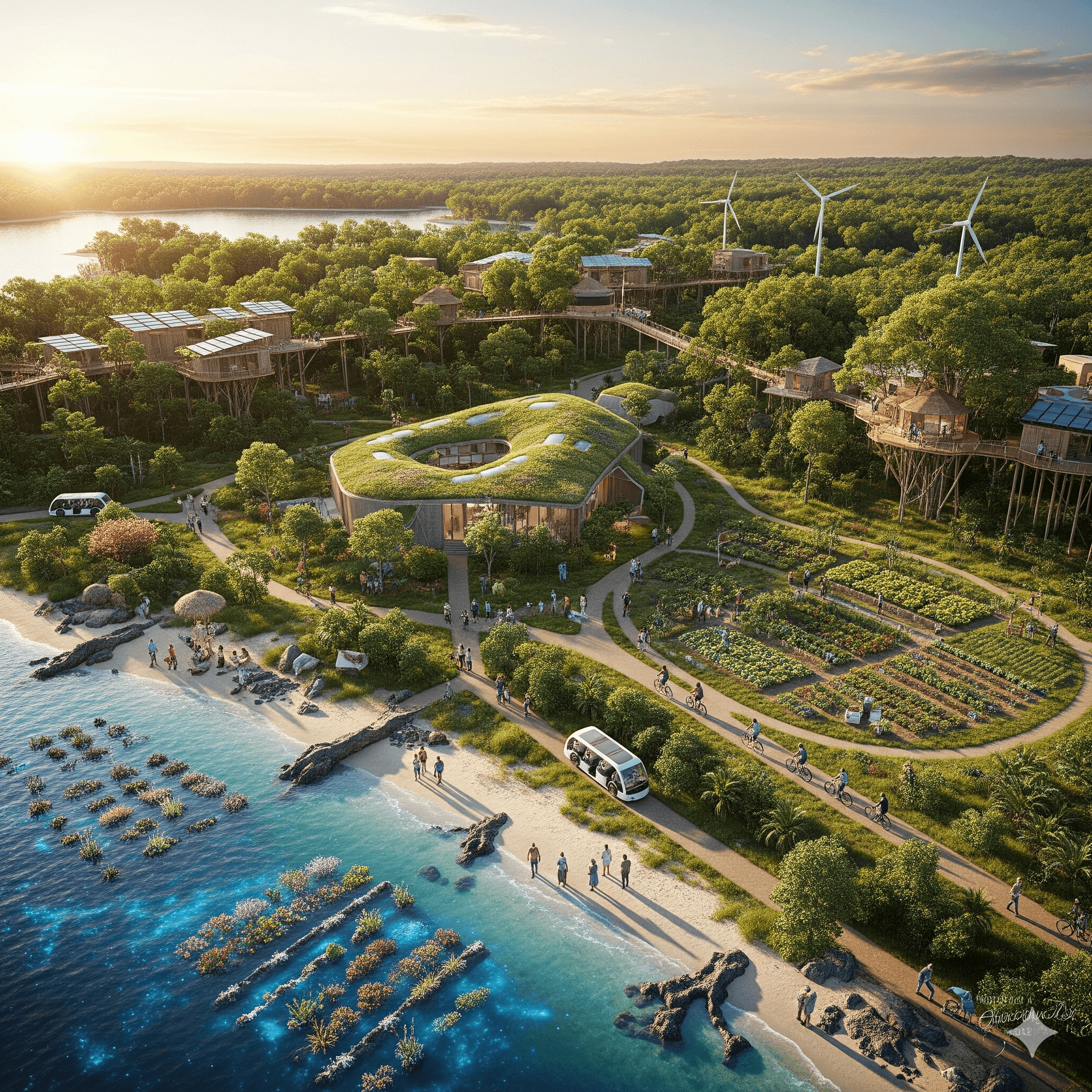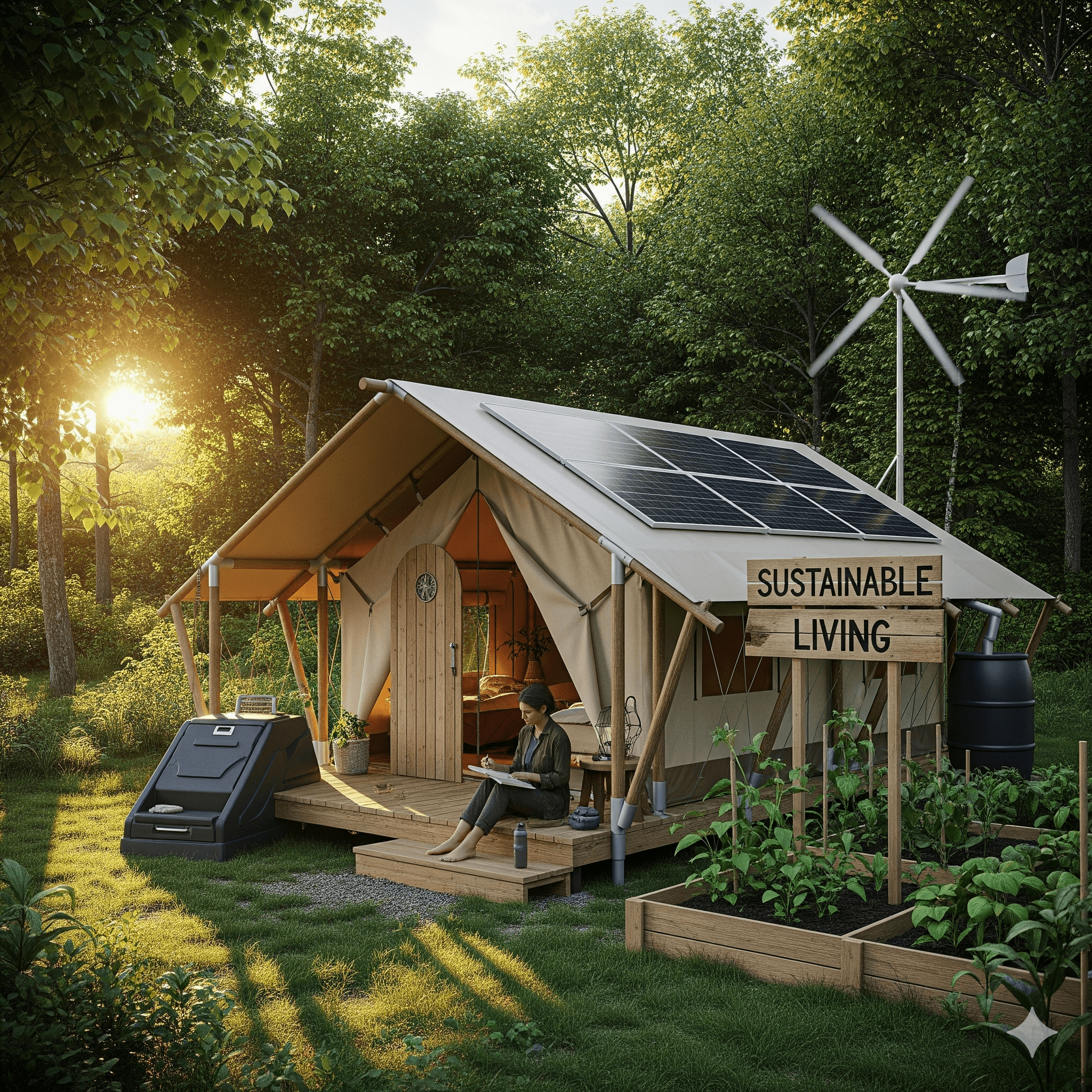Sustainable Travel Trends: Shaping the Future of Responsible Tourism in 2025
Explore the revolutionary sustainable travel trends transforming tourism in 2025, from regenerative practices and green transportation to carbon-neutral initiatives and technology-driven solutions that prioritize environmental stewardship and community well-being.

Introduction
The Rise of Regenerative Tourism
Regenerative tourism has emerged as the gold standard for sustainable travel, moving beyond the traditional goal of minimizing harm to actively restoring and improving destinations through visitor engagement. This revolutionary approach focuses on healing degraded ecosystems, supporting biodiversity recovery, and strengthening local communities through tourism activities that contribute positively to environmental and social well-being. Regenerative tourism projects include reforestation initiatives where travelers plant native species, marine conservation programs that engage visitors in coral reef restoration, and community development projects that preserve cultural heritage while providing economic opportunities for local residents.

Regenerative Tourism Impact
Destinations implementing regenerative tourism practices report measurable improvements in ecosystem health, increased local employment, cultural heritage preservation, and enhanced visitor satisfaction through meaningful engagement experiences that create lasting positive impact.
- Ecosystem Restoration Projects: Travelers participating in reforestation, wetland restoration, and biodiversity conservation initiatives during their visits
- Community-Based Tourism: Local communities leading tourism experiences that preserve cultural traditions while generating sustainable income
- Carbon Sequestration Activities: Tourism experiences that actively remove carbon from the atmosphere through conservation and restoration projects
- Wildlife Conservation Programs: Visitor engagement in species protection, habitat restoration, and anti-poaching initiatives that support biodiversity
- Cultural Heritage Preservation: Tourism that supports traditional crafts, languages, and customs while providing authentic cultural exchange opportunities
Revolutionary Green Transportation Solutions
Transportation innovation has reached a transformative moment with electric aircraft, hydrogen-powered trains, and comprehensive electrification of ground transport reshaping how we move between and within destinations. Electric vertical takeoff and landing aircraft (eVTOL) are beginning commercial operations for urban mobility, offering clean alternatives to traditional helicopter transfers while reducing noise pollution. The expansion of high-speed rail networks across Europe and Asia provides comfortable, efficient alternatives to short-haul flights, with some routes achieving carbon emissions 90% lower than equivalent air travel.
| Transportation Mode | Innovation Technology | Environmental Benefit | Availability in 2025 |
|---|---|---|---|
| Aviation | Electric aircraft for short-haul flights | Zero direct emissions, reduced noise pollution | Limited commercial routes, expanding rapidly |
| Rail Transport | Hydrogen-powered and electric trains | 90% lower emissions than aviation | Extensive networks in Europe and Asia |
| Ground Transport | Electric buses, taxis, and ride-sharing | Zero local emissions, renewable energy integration | Widespread deployment in major cities |
| Water Transport | Electric and hybrid ferries and boats | Reduced marine pollution, quiet operation | Growing adoption in coastal destinations |
Carbon-Negative and Climate-Positive Destinations
Leading destinations are achieving carbon-negative status through comprehensive strategies that combine renewable energy adoption, forest conservation, sustainable agriculture, and innovative carbon capture technologies. Bhutan, the world's first carbon-negative country, demonstrates how national policies can create tourism models that actively benefit the environment while providing exceptional visitor experiences. Slovenia, Costa Rica, and Sikkim in India represent additional examples of destinations achieving remarkable sustainability outcomes through integrated approaches combining environmental protection with responsible tourism development.
"Carbon-negative destinations like Bhutan prove that tourism can be a force for environmental good, absorbing more carbon than they produce while creating meaningful experiences that inspire visitors to adopt sustainable practices in their own lives and travels."
— Sustainable Tourism Development Report 2025
Technology-Driven Sustainability Solutions
Advanced technologies are revolutionizing sustainable travel through AI-powered personalization that matches travelers with eco-friendly options, blockchain systems that verify sustainability credentials, and mobile applications that provide real-time environmental impact tracking. Virtual and augmented reality technologies offer immersive experiences that satisfy wanderlust while eliminating travel-related emissions, while blockchain ensures transparency in carbon offset programs and sustainability certifications. AI platforms analyze traveler preferences to recommend destinations, accommodations, and activities that align with individual sustainability values while maintaining high satisfaction levels.
- AI-Powered Personalization: Intelligent systems matching travelers with sustainable accommodations, transport, and experiences based on preferences and values
- Blockchain Verification: Transparent tracking of carbon offsets, sustainability certifications, and ethical sourcing throughout the travel supply chain
- Virtual Reality Experiences: Immersive virtual tours reducing travel demand while satisfying exploration desires through realistic destination experiences
- Real-Time Impact Tracking: Mobile applications providing immediate feedback on environmental footprint and sustainable alternatives for travel decisions
- Smart Destination Management: IoT sensors and data analytics optimizing visitor flows, resource usage, and environmental impact in real-time
Sustainable Accommodation Revolution
The accommodation sector has embraced sustainability through innovative design, renewable energy integration, and circular economy principles that minimize waste while maximizing guest comfort. Eco-resorts featuring solar panels, rainwater harvesting, and locally-sourced materials provide luxury experiences with minimal environmental impact, while upcycled hotels transform abandoned structures into unique accommodations that demonstrate creative reuse of existing buildings. Green certifications including LEED, EarthCheck, and Global Sustainable Tourism Council standards help travelers identify genuinely sustainable options while encouraging continuous improvement in accommodation sustainability practices.

Local Community Engagement and Cultural Preservation
Sustainable travel in 2025 prioritizes authentic community engagement that respects local customs, supports indigenous cultures, and ensures tourism benefits reach community members rather than external operators. This approach involves travelers participating in cultural exchange programs, learning traditional crafts from local artisans, and staying in community-operated accommodations that provide direct economic benefits to residents. Indigenous-led tours offer deep cultural insights while supporting tribal communities, while agritourism experiences connect visitors with sustainable farming practices and local food systems.
Community-Centered Tourism
Successful sustainable travel initiatives demonstrate that authentic community engagement creates more meaningful experiences for travelers while providing sustainable economic opportunities for local communities through tourism activities that preserve rather than exploit cultural heritage.
Slow Travel and Mindful Mobility
The slow travel movement has gained significant momentum as travelers seek deeper connections with destinations through extended stays that reduce transportation emissions while enabling more meaningful cultural immersion. This approach emphasizes spending more time in fewer places, using local transportation methods, and engaging with communities in ways that support local economies while minimizing environmental impact. Slow travel aligns perfectly with remote work trends, enabling digital nomads and flexible workers to establish temporary residence in destinations while contributing to local communities through extended engagement and spending.
- Extended Destination Stays: Longer visits reducing per-day transportation emissions while enabling deeper cultural understanding
- Local Transportation Integration: Using public transit, cycling, and walking to explore destinations while supporting local transport systems
- Workation and Bleisure Travel: Combining work and leisure travel to extend stays while maintaining productivity and engagement
- Seasonal Destination Planning: Choosing travel timing to support destinations during off-peak periods while avoiding overtourism
- Multi-Generational Travel: Family and group travel experiences that create shared memories while distributing environmental impact
Carbon Offsetting and Climate Action
Carbon offsetting has evolved from simple tree-planting programs to sophisticated climate action initiatives that support renewable energy projects, methane capture systems, and community-based conservation programs with measurable environmental impact. Blockchain technology ensures transparency and traceability in offset programs while preventing double-counting and fraudulent credits. Leading travel companies integrate carbon offsets directly into booking platforms, making climate action convenient and accessible for travelers while supporting verified projects that deliver additional social and environmental benefits beyond carbon reduction.
| Offset Program Type | Environmental Impact | Additional Benefits | Verification Methods |
|---|---|---|---|
| Reforestation Projects | Carbon sequestration, biodiversity restoration | Local employment, ecosystem services | Satellite monitoring, field verification |
| Renewable Energy | Avoided emissions from fossil fuel displacement | Clean energy access, economic development | Energy generation monitoring, impact assessment |
| Community Conservation | Forest protection, habitat preservation | Indigenous rights, sustainable livelihoods | Community monitoring, independent auditing |
| Technology Innovation | Direct air capture, methane reduction | Technology development, scalable solutions | Scientific measurement, blockchain tracking |
Sustainable Food and Dining Experiences
Culinary tourism has embraced sustainability through farm-to-table experiences, plant-based dining options, and support for local food systems that reduce transportation emissions while preserving culinary traditions. Restaurants and food experiences emphasizing locally-sourced ingredients, seasonal menus, and reduced food waste provide authentic flavors while supporting regional agriculture and minimizing environmental impact. Food tourism experiences including cooking classes with local ingredients, visits to organic farms, and participation in traditional food preservation methods create memorable experiences while supporting sustainable food systems.

Wildlife Conservation Tourism
Wildlife tourism has evolved to prioritize conservation outcomes through responsible viewing practices, habitat protection funding, and community-based conservation programs that demonstrate the economic value of wildlife preservation. Ethical wildlife experiences maintain appropriate distances from animals, support conservation research, and contribute directly to protection efforts while educating visitors about biodiversity challenges and conservation solutions. These programs prove that tourism can be a powerful force for wildlife protection when designed and managed with conservation as the primary objective.
Conservation Impact Tourism
Well-managed wildlife tourism generates over $80 billion annually for conservation efforts while providing sustainable livelihoods for local communities and creating powerful advocacy for species protection among international visitors.
Implementation Challenges and Solutions
Despite significant progress in sustainable travel, the industry faces ongoing challenges including greenwashing concerns, infrastructure limitations, cost barriers, and the need for standardized sustainability measurements. Addressing these challenges requires continued innovation, regulatory support, industry collaboration, and consumer education to ensure that sustainability claims are genuine and impactful. Solutions include third-party certifications, transparent reporting standards, government incentives for sustainable tourism development, and educational campaigns that help travelers make informed decisions about sustainable travel options.
- Greenwashing Prevention: Third-party certifications and transparent reporting standards ensuring genuine sustainability practices
- Infrastructure Development: Investment in sustainable transportation and accommodation infrastructure supporting responsible tourism growth
- Accessibility and Affordability: Making sustainable travel options accessible to diverse income levels and travel preferences
- Standardized Measurements: Consistent metrics for measuring and comparing sustainability performance across destinations and providers
- Education and Awareness: Consumer education programs helping travelers understand and choose genuinely sustainable options
Future Outlook and Emerging Trends
The future of sustainable travel will be shaped by continued technological innovation, evolving consumer expectations, and urgent climate action needs that require even more ambitious sustainability targets. Emerging trends include space tourism considering environmental impact, underwater accommodation exploring marine conservation, and extreme weather tourism that educates visitors about climate change while supporting adaptation efforts. The integration of artificial intelligence, quantum computing, and advanced materials science will enable new approaches to sustainable travel that are currently difficult to imagine.
Future Innovation Pipeline
Emerging technologies including quantum-enhanced optimization, advanced biomaterials, and atmospheric carbon capture integrated with tourism infrastructure promise to further revolutionize sustainable travel while creating new opportunities for positive environmental impact.
Conclusion
Sustainable travel trends in 2025 represent a fundamental transformation of the tourism industry toward regenerative practices that heal rather than harm our planet while creating more meaningful, authentic, and enriching experiences for travelers. With 93% of global travelers committed to sustainable choices, the industry has responded with innovations spanning electric aviation and carbon-negative destinations to community-based tourism and blockchain-verified sustainability credentials that ensure genuine environmental and social impact. This evolution demonstrates that sustainability and exceptional travel experiences are not only compatible but mutually reinforcing, with sustainable practices often delivering superior authenticity, cultural connection, and personal fulfillment compared to traditional tourism approaches. The travel companies, destinations, and travelers who embrace these trends are not just protecting the environment—they're pioneering a new paradigm of travel that enriches lives while preserving the natural and cultural treasures that make exploration so rewarding. As we move forward, the most successful sustainable travel initiatives will be those that seamlessly integrate environmental stewardship with community empowerment, technological innovation with cultural preservation, and global connectivity with local authenticity, creating a travel industry that serves as a force for positive change in the world while continuing to fulfill humanity's fundamental desire to explore, learn, and connect across cultures and landscapes.
Reading Progress
0% completed
Article Insights
Share Article
Quick Actions
Stay Updated
Join 12k+ readers worldwide
Get the latest insights, tutorials, and industry news delivered straight to your inbox. No spam, just quality content.
Unsubscribe at any time. No spam, ever. 🚀
